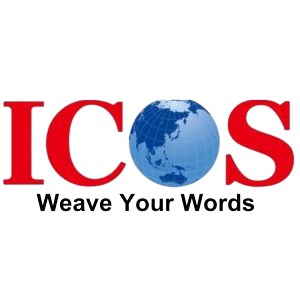7 Powerful Reasons European Translation Services Will Make or Break Your Brand
The snowstorm rages on. Streets buried under thick blankets of slush, traffic lights blinking into the void, and somewhere in that swirling chaos, there’s a lone pizza delivery guy, clutching onto his handlebars like his life depends on it.
His wipers are doing jazz hands on the windshield, the tires are whirling like they’re auditioning for ice ballet, and inside that delivery box… your pizza; it’s bouncing in the backseat like it’s training for the Olympics.
Cheese is sliding, toppings are fighting for survival, every bump, every wrong turn, and every skid makes your pizza less pizza… and more disaster. And by the time it reaches your doorstep, it’s a soggy, sad mess you didn’t pay for.
Now, swap that pizza for your brand message. Swap that snowstorm for Europe’s unpredictable market terrain. And that poor delivery guy: That’s you, steering your global strategy straight into linguistic chaos, without proper translation to guide the way.
You better buckle up after this, because your strategy’s about to skid without the right translation, faster than you can point to Belgium on a map.
Europe isn’t just “Europe.” It’s not one giant continent where people sip espresso and cheer for one football team. It’s 50 countries, hundreds of dialects, thousands of cultural quirks, and about zero patience for brands who think English is enough.
You could go in blind, blast your English ads from Paris to Prague, and watch your brand flop harder than a B-movie sequel. Or… you could be smart about it.
So you can understand from the stats that Businesses are understanding the importance of translation and Localization in Europe.
Hence, you can choose to be the lost delivery guy fumbling through cultural black ice, or you can be the brand that shows up hot, fresh, and understood.
If you want to deliver your message flawlessly, here are 7 powerful reasons why hiring a European Translation Company is your best move.
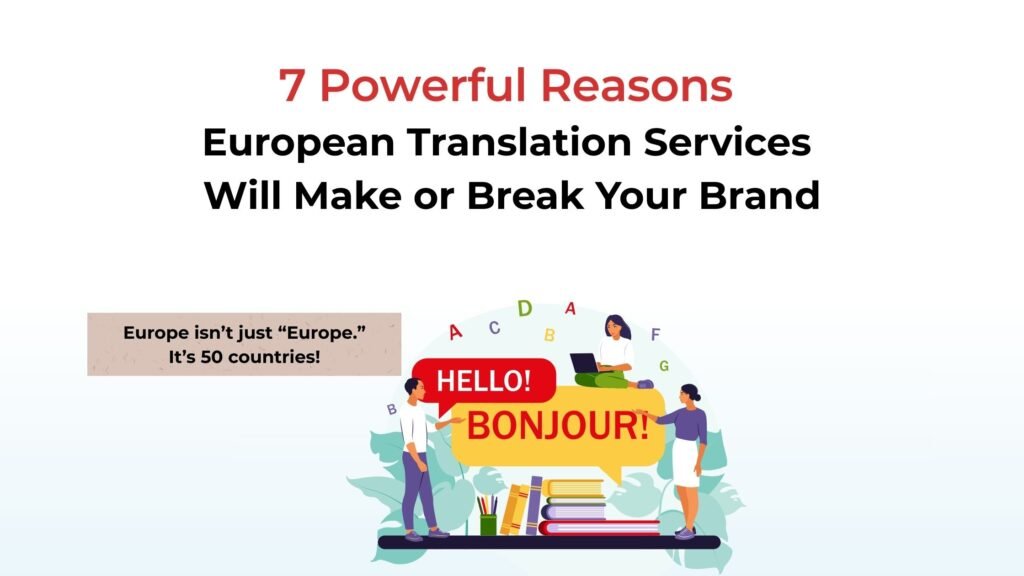
1. Europe’s Patchwork of Cultures Demands More Than Generic Messaging
Europe isn’t one big continent, it’s a patchwork of cultures stitched together by geography, not uniformity.”
You are dealing with:
- A German who wants it to be efficient,
- A Spaniard who’s offended if you rush through lunch,
- A French customer who considers your brand’s elegance before price,
- An Italian who doesn’t care for formality but will judge your design sense in seconds,
- And a Scandinavian who’ll politely ignore you if you’re too pushy.
See the problem? And the opportunity.
Every country in Europe doesn’t just speak a different language, it lives in a different rhythm. From siesta hours in Spain, “out of office” Fridays in France, to silent Sundays in Germany, if your emails ping at the wrong time, you’re roasted
Brands like Lush figured this out early- no aggressive upselling in Europe. Just gentle, ethics-driven storytelling. Their “fight animal testing” campaigns worked brilliantly in the UK, Germany, and the Netherlands because they tapped into what Europeans already cared about.
Lesson? You don’t invade the European market. You earn your space at their dinner table by understanding their customs, language, and values.
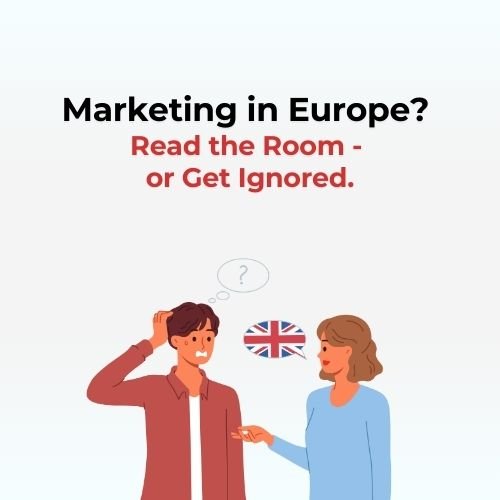
2. Localization, Not Just Translation, Builds Lasting Brand Relevance
You could take your English ads, translate them perfectly into French, and people would still hate you in France.
Why?
Because it’s not the words: it’s the feel.
- France doesn’t want “Buy Now.” They want “Découvrez” – Discover. You don’t “grab a deal,” you “experience the value.”
- The Dutch hate overpromising: You can’t say “best in the world” – you need to prove it. They prefer honesty over hype.
- Finns value brevity: Waffle too much and they’ll close your tab.
- The Spanish prefer friendly tones: If you are too corporate, you’re cold.
- The Germans want crystal clarity: Give them vague claims, and you’re instantly irrelevant.
Localization isn’t about translation– it’s behavioral language. When you sound like them, they listen. When you sell like them, they buy.
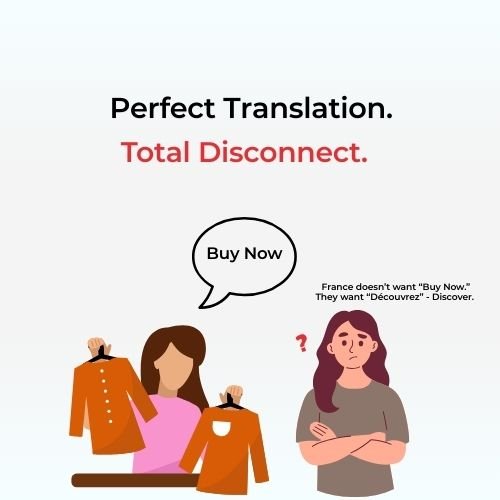
3. Ignoring Native Languages Guarantees Lost Sales and Brand Disconnect
A common misconception, especially among American and Asian brands, is believing that English is Europe’s ‘business language’. While English is widely understood, it is not emotionally persuasive to most European customers, especially in purchasing scenarios.
One of the largest mistakes is neglecting localized customer journeys. English-only websites perform poorly in conversion rates across countries like France, Spain, and Germany. Even the tone of advertising suffers: Germans seek clarity, French consumers expect sophistication, while Spaniards prioritize friendliness.
Brands who skip professional European translation services risk:
- Higher bounce rates on websites
- Poor email marketing performance
- Unresponsive ad campaigns
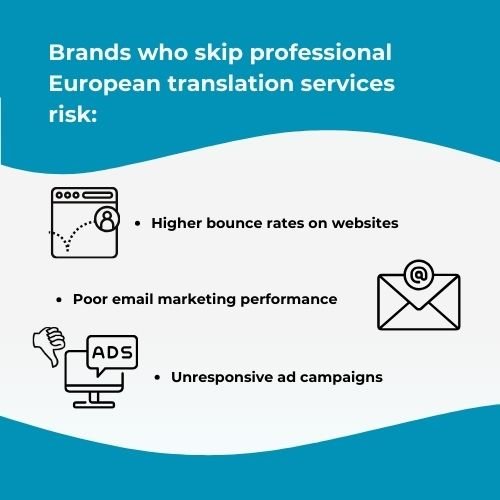
4. Local SEO Optimization Leads To True Market Visibility in Europe
Your SEO strategy must be rebuilt for every European market because Google rankings are crucial. What ranks in London doesn’t rank in Paris or Berlin. Europeans use local search engines, local slang, and local idioms.
Here’s an example breakdown:
Country | Search Engine Behavior | Example Keyword Difference |
France | Google.fr prefers French phrases | “chaussures élégantes” vs. “elegant shoes” |
Germany | Google.de prefers clarity-focused search terms | “günstige Angebote” vs. “cheap deals” |
Spain | Google.es likes casual and colloquial keywords | “ropa chula” vs. “cool clothes” |
European translation services help tailor your SEO for every market, ensuring local visibility and traffic growth.
5. Aligning with Local Payment Habits Dramatically Reduces Cart Abandonment
Payment is a cultural factor often overlooked. Europeans have country-specific payment behaviors, and failing to meet those expectations leads to cart abandonment.
Examples include:
- Sweden prefers Klarna (buy now, pay later).
- Germany favors GiroPay and invoice-based payments.
- France leans towards card payments and Apple Pay.
- The Netherlands trusts iDeal above all.
Localization services help integrate local payment options, improving conversion rates dramatically. Without it, brands lose trust at the most critical point: checkout.
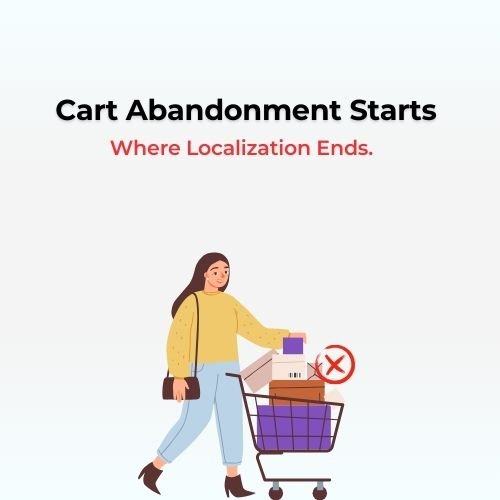
6. Localized Customer Support Creates Loyalty and Repeat Sales
Great European translation services go beyond words, they help personalize customer experiences. They provide:
- Native-speaking customer support representatives
- Country-specific support etiquette
- Localized automated replies
Example:
Instead of a global chatbot, a Spanish customer chats with Marta in Madrid, or a Swedish buyer gets Emil in Stockholm, using local expressions and humor.
This humanizes your brand and ensures higher satisfaction, retention, and advocacy rates.
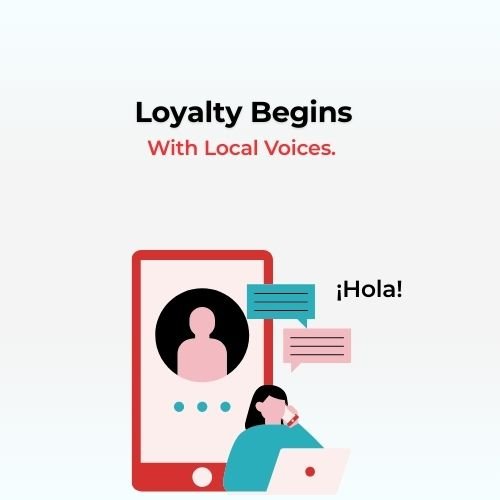
7. AI-Only Translation Risks Cultural Missteps That Cost You Customers
AI translation tools have improved but fail to grasp cultural nuance, humor, slang, and tone all essential to European audiences.
AI-only content often:
- Sounds robotic
- Misuses idioms
- Misjudges emotional cues
Worst case scenario? Offending your target audience and causing reputational damage.
Professional European translation services blend AI speed with human expertise, ensuring cultural accuracy and emotional connection. It’s not AI vs. human—it’s AI + human that wins in Europe.
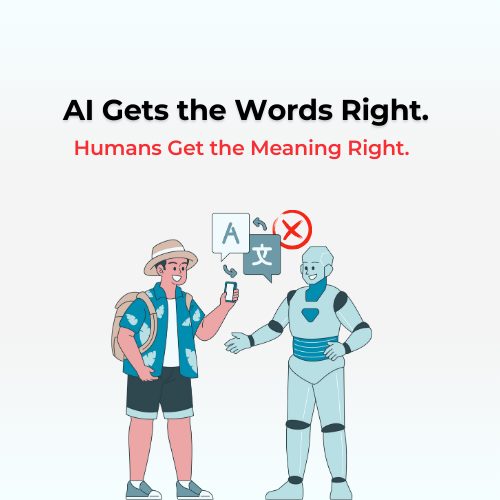
FAQs
How to localize your brand with European translation services?
Start by hiring specialists who understand both your industry and your target region. Localization involves adapting tone, imagery, cultural cues, and even payment systems to fit the preferences of each market.
Which languages are essential for European market translation?
Start with the Big Five: French, German, Spanish, Italian, and Dutch. Add Polish, Portuguese, and Swedish based on your industry and target segments.
Why hire a European translation agency for market expansion?
Because they get the local pulse. From linguistic accuracy to cultural depth, agencies make your message feel like it was born there.
How can English-to-European translation improve customer engagement?
By speaking to people in a way that they actually feel. Contextual, natural, and emotionally relevant communication always converts better.
What are the benefits of working with European translation companies for startups?
Startups move fast, and good agencies move with you. They help you punch above your weight in new markets without losing your voice or your budget.
Signing Off:
So, after all that skidding, sliding, and navigating through cultural traffic, here’s where you stand: the European market isn’t some straight highway where you can speed through with a generic brand voice.
It’s more like a collection of side streets, local shortcuts, and region-specific no-entry signs. The kind where every wrong turn costs you not just time, but trust.
Your message, no matter how polished, only travels as far as people understand it. And understanding isn’t built on direct translations. It’s built on meaning. On familiarity. On feeling like your brand didn’t just show up: it belongs.
The brands that win across Europe aren’t trying to be “international.” They’re trying to be locally unforgettable. They build campaigns that sound like they were written two blocks down the street, not across an ocean.
In business, you don’t get points for effort. You get points for relevance. And relevance starts by speaking the language : properly, respectfully, and fluently.
If you want to be visible in Europe, you don’t shout louder. You speak smartly.
Before your message skids off the road in Europe, start with a simple step get a professional localization audit.
